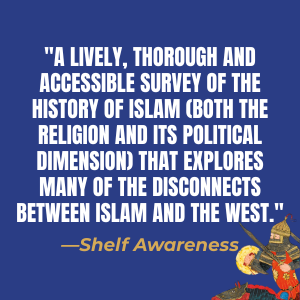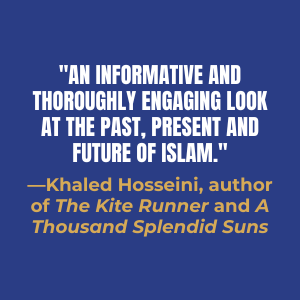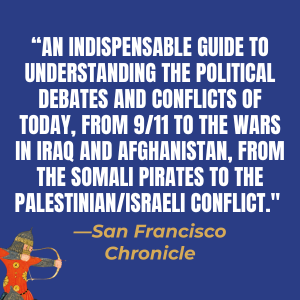Customer Services
Copyright © 2025 Desertcart Holdings Limited


📖 Unlock the World’s Secrets Through Islamic Eyes!
Destiny Disrupted: A History of the World Through Islamic Eyes offers a unique exploration of global history, presenting events and narratives from Islamic perspectives. This book is essential for anyone looking to deepen their understanding of cultural dynamics and historical contexts that have shaped our modern world.



| Best Sellers Rank | #28,101 in Books ( See Top 100 in Books ) #2 in Central Asia History #2 in Islamic Social Studies #6 in History of Islam |
| Customer Reviews | 4.6 4.6 out of 5 stars (2,137) |
| Dimensions | 5.5 x 1.04 x 8.25 inches |
| Edition | Reprint |
| ISBN-10 | 1586488139 |
| ISBN-13 | 978-1586488130 |
| Item Weight | 2.31 pounds |
| Language | English |
| Print length | 416 pages |
| Publication date | April 27, 2010 |
| Publisher | PublicAffairs |
G**T
Ansary delivers an amazing book that is a must-read to understand current world affairs
I'm a major history buff. However, I'll freely admit to having done much more reading in American history than other topics. For example, I've read more biographies of George Washington than I have histories on Asia and the Middle East combined (unless maybe you give me partial credit for Japan and World War II). And, while such a trend is unlikely to change completely, I have started making some effort to branch out. An early pick for this effort was Tamim Ansary's 2009 Destiny Disrupted: A History of the World Through Islamic Eyes. Ansary's ambitious attempt to introduce the Islamic view of world history is fantastic, and well worth reading for any history fan, especially those like me who have been provincial in their previous reading. Ansary, who was born of an Afghan father and American mother in Afghanistan and moved to the United States in high school, is very well-suited to act as a bridge for the two worlds for his readers. He is able to see Islamic culture from an insider's point of view while also recognizing its place in relation to the Western view of history, and explain all of that to a Western audience - no small task, that. Ansary begins with a brief introduction the Middle East (itself a very Western-centric term, of course) before Muhammad's arrival on the scene. He then devotes a large segment of the book to Muhammad's time and that of the first four Caliph's to follow him. Since this was obviously such a major event in the formation of Islamic culture and outlook, the detailed look at this period is worth the space devoted to it, as it shapes everything that follows. The book then moves into detailing the political, social, and religious changes in and challenges to Islam over the years, and how even dividing that into three themes as I did is an artificial external imposition, since from within Islam, the political, social, and religious are so often all one thread. Ansary introduces all the major empires, religious schisms, and so on, until the Western narrative collides with Islam, at first with the minor - as far as Islam was concerned - detail of the Crusades - and then later in the 18th and 19th centuries as Western powers and greedy rulers slowly end up with foreigners calling the shots, openly or behind the scenes, in many major Islamic former powers. Ansary then details the natural response to that from Islam as it has sought to take back its own destiny. Ansary does an amazing job of bringing all the historical figures to life and entertaining the reader. As he states in his introduction, his approach is less an academic tome and more a conversation about just what the heck is going on over there with Islam. For such a broad and sweeping attempt to introduce the Islamic view of the world to readers unfamiliar with it, it's a perfect approach to engage while educating. I listened to Blackstone Audio's 2009 production of the book, narrated by Ansary himself. The production was very well done, and Ansary does a fantastic job. Author narration can be hit or miss, but Ansary really hits a great tone that's easy to listen to and indeed fits his conversational writing approach, and he nails all the pronunciation that another reader would trip over. The unabridged production runs approximately 17.5 hours. I've become a fan of Ansary with Destiny Disrupted, and I definitely plan to read more from him - and if possible listen to him. His history of Afghanistan, Games Without Rules, also self-narrated, is high on my to read list. I also aim to read more about some of the topics Ansary introduces from other authors, so much has my curiosity been piqued. Ansary does an amazing job of making a vital part of world history accessible to the average Western reader. Given the modern state of the world, it's imperative we Americans understand how our two cultures ended up where we are. Ansary's Destiny Disrupted is an excellent place to start.
J**R
Fascinating and important alternative way of looking at world history
Ansary, who grew up in Muslim Afghanistan, tells the story of world history as the Islamic world saw it from the time of Mohammad, through the fall of the Ottoman Empire to modern post-9/11 times (but pre-ISIS). He discusses, in fascinating, well-documented detail how our civilizations grew up seemingly oblivious to each other. He prefers to refer to what we call “the Middle East” as “the Middle World”— the whole area from the Indus to Istanbul—since Middle East assumes that one is standing in Western Europe. I doubt the term will catch on but it’s well-founded. What is particularly notable is the author’s very balanced, neutral view of things, considering how difficult it can be to compare these world views. That is to say, he pulls no punches in portraying the early years of Islam with assassinations, extreme corruption, wars and battles, backbiting, conspiracies and general nastiness among Shi’a, Sunni, Sufi, Sikhs and other splinter groups including later developments of Wahhabism, Salafism, etc. Of course Christian Europe comes in for its share but the conflict of civilizations is well-balanced. But where the book really shines is in its presentation of how various discoveries, scientific achievements, and historical world events were built from one another successively in an interconnected way — to borrow the terminology of the excellent BBC documentary series, "Connections." One historical theme in particular stands out: dealing with the Crusades — an inherently Europeanized concept. From the Arab side, it was not an epic struggle between Islam and Christendom…that was the story line the Crusaders saw. Instead of a clash of civilizations, the Muslims, who called this period the Franj Wars, saw it as a calamity befalling civilization itself. When they looked at the Franks they saw no evidence of civilization, just uncultured warlike beasts. The book then connects how the Crusades gave way to what Europeans call the Age of Discovery as the seafaring Europeans sought to find a way to avoid the Muslim problem involved in getting through the Middle World, eventually leading to Columbus seeking a more efficient direct route. In my personal view, it is essential to understand modern ISIS terrorism, Boko Haram, al-Qaeda, Taliban and other no-doubt soon-to-arise outrages in the context of their historical roots. These groups didn’t simply arise by accident or as religious pranks. Each can usually be seen as the response mechanisms of peoples who feel disenfranchised, outraged, powerless to combat social/religious abominations, often—usually—because of the direct exploitative interventions of Western interests. This in no way excuses atrocities but perhaps offers a lesson to be learned about hazards of cultural imperialism. My only criticism of the book is its vague and unhelpful main title which seems to have been selected for its alliterative value rather than informing us of anything. In fact, though I spend considerable time reading, highlighting and annotating this fine book, I'm invariably at a loss to tell someone what the title is.
G**E
Great histary
Y**U
This book gives a clear brief description of the history of the Middle World with some deep thoughts on the recent history!
B**N
We are good at seeing the world though our own eyes, through our own traditions. And we tend to assume that our perspective is the truth, when it is actually only our understanding of `the truth'... something which exists outside of us. How much of how we view the world today is based on the way we were taught history, through the lens of western historians and policy makers? This book "Destiny Disrupted" is the story of world history seen through a particular lens: that of Muslims, who have their own 1400 year history which was not much intertwined with Europe. We can learn a good bit both about Islam and about world history by taking in this different perspective, written by a Muslim who is not afraid to be self-critical, to distinguish between what is known and what is believed about history, and who loves to tell it as a good story. Ansary has spent years writing in an accessible style for western readers, and this is an enjoyable and informative read. I wonder how other Muslims respond to this book, and hos much his perspective is influenced by his Afghan heritage, with its Persian influences.
A**O
Very fast seller. And very reliable, and very kind. Simply perfect.
A**E
People in the review section losing their minds because this book contradicts western narrative about a few things. This is a book about the view on history from Islamic eyes. Of course thinks will be written in a different way when you tell the story out of a pov. In conclusion: this book is amazing. I really enjoyed reading it and learnt a lot about Islam and the Middle East itself. It really made me question a lot about what I thought of „history“ so far. If you like it or not, people will always write and tell things differently when it benefits them. Do your fact checks through multiple sources and get your own understanding.
Trustpilot
3 weeks ago
5 days ago